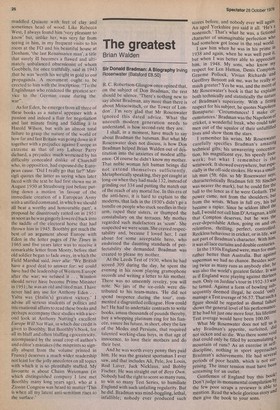The greatest
Brian Walden
Sir Donald Bradman: A Biography Irving Rosenwater (Batsford £8.50) R. C. Robertson-Glasgow once opined that, on the subject of Don Bradman, the rest should be silence. 'There's nothing new to say about Bradman, any more than there is about Moiseiwitsch, or the Tower of Lon don'. I'm very, glad that Mr Rosenwater ignored this dated advice. What the uncouth modern generation needs to understand, is how second-rate they are.
I shall, in a moment, have much to say about Bradman the batsman. But what Mr Rosenwater does not discuss, is how Don Bradman helped Brian Walden out of destitution into the anxieties of modest affluence. Of course he didn't know my mother. That noble woman felt human beings did not extend themselves sufficiently. Metaphorically speaking, they got caught at long-on when they had made 132, instead of grinding out 334 and putting the match out of the reach of any mortal foe. In this era of the anti-hero, it is hard to explain to the moderns, that lads in the 1930's didn't go a bundle on people who stuck needles in their arm, raped their sisters, or thumped the constabulary on the terraces. My mother regarded such malefactors as 'scum'. She suspected we were scum. She craved respectability and, because I loved her, I cast about for some acceptable hero, who enshrined the daunting standards of perfectability she demanded. Bradman was created to please my mother.
At the Leeds Test of 1930, when he had scored 309 during the day, he spent the evening in his room playing gramophone records and writing a letter to his mother. There was no unseemly revelry, you will note. No jars of the ice-colds were distributed to his team-mates. 'He did not spend twopence during the tour', commented a disgruntled colleague. How could he? He had to undertake contracts to write books, amass thousands of pounds thereby, buy a whopping platinum ring for his fiancée, assure his future, in short, obey the law of the Medes and Persians, that required talented working-class boys, in that age of innocence, to love their mothers and do their best.
And he was worth every penny they paid him. He was the greatest sportsman I ever saw, and that includes Ali, Pele, Joe Louis, Rod Laver, Jack Nicklaus, and Bobby Fischer. He was straight out of Boys Own. Nobody had the right to score so many runs, to win so many Test Series, to humiliate England with such unfailing regularity. But he did. Bradman was mind-boggling, lethal, infallible; nobody ever produced such scores before, and nobody ever will again. An aged Yorkshire pro said it all. 'He's a nonesuch.' That's what he was, a fictional character of unimaginable perfection wh° had somehow got loose in the real world, I saw him when he was in his prime in 1938 and again, when he was well past it but when I was better able to appreciate him, in 1948. My sons, who know MY respect for Len Hutton, Denis Compton, Graeme Pollock, Vivian Richards and Geoffrey Boycott ask me, was he really sn much greater? Yes he was, and the merit of Nefr Rosenwater's book is that he explains both technically and statistically the nature of Bradman's superiority. With a fitting respect for his subject, he quotes Napoleon Bonaparte: 'Circumstances! I make eir" cumstances.' Bradman was the Napoleon of cricket, a wonderful freak, who could take men out of the squalor of their unfulfilled lives and show them the stars. I remember his wrists. Mr Rosenwater carefully specifies Bradman's amazing technical gifts; his unwavering concentration, his magnificent eye, his speedy font" work; but what I remember is the wristwork. It showed everywhere, but especially in the off-side strokes. He was a small' ish man (5ft. 61in. so Mr Rosenwater saYs; characteristically Bradman felt 5ft Sinches was nearer the mark), but he could fire the ball to the fence as if he were Goliath. The power came, not from the shoulders, but from the wrists. When in full cry, his bat became a rapier. Since he seldom lifted die ball, I would not call him D'Artagnan, a title that Compton deserves, but he was the ever-dependable Athos, going on and on' relentless, thrilling, perfect, controlled. Reckless behaviour in cricket, or in life, was not part of Bradman's character. With WI' it was all lace curtains and double centuries. In the 1930s England were, man for man' rather better than Australia. But against superman we had no chance. Besides scot" ing twice as many runs as anybody else, he was also the world's greatest fielder. It was as if England were playing against thirteen men. Only on Jardine's tour in 1932-33 was he tamed. Against a form of bowling OPsequently deemed illegal, he could 'ontY' manage a Test average of 56.57. That such a figure should be regarded as dismal failure shows the general level of his performance. If he had hit just one more four, his lifetime Test average would have been 100.00. What Mr Rosenwater does not tell us .iAs why Bradman's appetite, surfeited, not sicken and so die. Was there some "°18 that could only be filled by accumulating mountain of runs? As an exercise in selfdiscipline, nothing in sport approaches, Bradman's achievements. He had several periods of poor health, which is not stir' prising. The inner tension must have beet' screaming for an outlet. Gentlemen of England buy this book! Don't judge its monumental compilation hY the few poor scraps a reviewer is able tnci mention. Read the whole glorious story an then give the book to your sons.






































 Previous page
Previous page